Bernat Soria: "The embryo must live at least two months in the womb to be human"
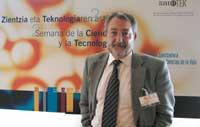
Andalusia has offered you the possibility of working with embryonic stem cells, but your research will not start from scratch, you have been working on it for a long time. What are the research you are doing to cure diabetes?
When the Ministry of Health banned us from using embryonic stem cells, we headed to Singapore. There we opened a new laboratory, about a year ago, and worked with stem cells of human embryos. They gave us permission to do so.
We have taken human embryos and extracted stem cells to grow and transform into the laboratory. Finally, we have made these stem cells produce insulin. At the moment we have achieved good results.
A few years ago they cured diabetic mice by transplanting embryonic stem cells. Are the results you have achieved with humans so spectacular?
Well, we still haven't got such amazing results as in the mouse. In the mouse these totipotent cells, which are not yet specialized, we put them to produce insulin and then transplant them in the mouse. That cured their diabetes. That is what we want to achieve in human beings, but we have not yet begun to perform transplants.
We have not had enough time.
In Europe, in general, legislation is quite strict regarding the use of human embryo cells. What does the scientific community think?
I think the role of scientists is to respect the opinion and sensitivity of those who think differently. But keep in mind that all associations of scientists, the National Academy of Science, all Nobel laureates and, in general, all people who have never violated human rights, consider that embryos must be used, that their stem cells are necessary and that therapeutic cloning must be done.
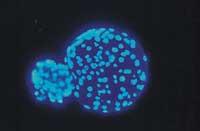
How is it possible for people who know so much and make so much sense to stand up for and governments not? I know that the governments of the United States and Spain have often violated human rights, but that has not happened in the National Academy of Science or in scientific associations. They defend the use of embryos by the existence of favorable biological data.
And what are these biological data? Are embryos human or not? And that is the argument of those who oppose this technique, embryos are human. But what does science say?
According to biological data, the embryo of few cells is not yet human. It's true that you have to go through there to become human afterwards, but that doesn't mean you're human.
Some believe that the embryo is from the beginning, even when it is monocellular; at that moment it receives the soul. And when that one cell is divided, which of them takes the soul? I don't want to joke, but... At that time are two half-people?
It is true that each embryo has a special, unique and unrepeatable combination of genes. But that doesn't make him human. It is vital, because the cells are alive, but human life and man are not the same.
Think that, according to the Catholic religion, the embryo becomes human at the very moment of fertilization; according to the Orthodox Jews, on the 40th day; and according to the Muslims, between the 40th and 120th days.
And for scientists?
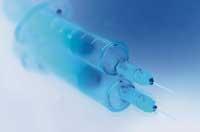
It is difficult to define it. And what criteria should we follow? When does man arise when the first traces of the nervous system appear? And without brain is it human? What is man? It is very difficult to define criteria.
Look, the embryo reaches the immune identity between weeks 6 and 7 and acquires the ability to live outside the uterus in the 5th or 6th month. I think the embryo has to live at least 2 months in the womb to be human.
And embryos of a few days are used in research, right?
Yes, embryos of very few cells are used, created a few days after fertilization, preferably 5-7 days. That is why I am in favor of using embryos in research. If the knowledge derived from these embryos serves to reduce the pain of patients, it is not ethical not to use it. I have ethical problems in that, not in use.
And if it's done right, I don't think it's very dangerous to say that using the stem cells of these embryos, one day we get cells that produce and store insulin.
At times, however, is there no disproportionate importance to certain studies and does not create corrupt expectations to achieve the support of society?
That behavior would not be ethical. The responsibility of scientists is to repeat over and over again that research is necessary, but sometimes it is not enough; often the personal goal is not achieved, but society cannot be deceived.
Our first results seem to indicate that the path we are making is correct. But the researcher cannot know the result, so no one can ask for guarantees of what can happen. For example, one of the arguments used by those who oppose the use of stem cells is quite poor: its usefulness has not yet been demonstrated. Of course, as long as no one does it, it cannot be demonstrated. It is not useful, nor useless. But in my opinion, scientific research, biomedical research, has given many examples of improving the quality of life of society in the last century and it is worth trying. I don't know if there is a solution, but if there is one, he is investigating. Without investigating we will find nothing.
And what do patients say, diabetics?
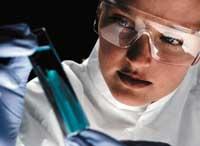
When I talk to patients they know that there is no guarantee of success, but they want to advance in research just in case, if from there came some useful knowledge... We therefore have patient protection. The confederation of all disability associations gave me a prize, a confederation that brings together more than three and a half million people. The patients unanimously decided to give me the prize. The event was attended by ministers. I don't know if they were happy to give me the prize because they were from the PP. But patients trust and want to investigate.
So, do politicians and not society put the biggest drawbacks?
In my opinion, more than politicians, a concrete political party. And neither the majority of that party, but the people who have authority within the party. They have great suspicion with all this.
Andalusia has had courage and has bet. And it's not the first time, the morning-after pill, transsexualism... has been a very important issue. And the central government has already resorted. What the central government does is that: first resort, then take it to the Constitutional Court and finally pass the law for the whole state. In the case of embryos, Andalusia has faced and probably the same. The data indicate that they will gradually be accepted in all countries, although Bush and Aznar go against it.
Bernat Soria is professor of physiology and director of the Institute of Bioengineering of the University Miguel Hernández of Alicante. He is one of the most important researchers in Spain, proof of this is his large number of awards. But the Valencian researcher knew the controversy over stem cells.

It was about four years ago. What was achieved then was a great effort, as it managed to cure diabetic mice with embryonic stem cells. And Bernat expressed his next goal: to cure diabetes also in humans. But in Spain it is not possible to use human embryo stem cells for scientific research. Embryos can be used for artificial insemination, but in no case for scientific research that can be the cure for many diseases. And the Valencian researcher hurried abroad.
Soria undoubtedly has a long professional career. His first contact with science was with neurons, who completed his doctoral thesis on nerve pulse transport. He then went to Germany to work with two promising young people. They worked with the ion channels that appear on the cell membrane, developing a technique called patch clamp. The other two received the Nobel Prize.
“Then I went to England and started working with a very special cell, which secretes insulin in the area, which to some extent acts as neurons.” He began to investigate diabetes. “We try to make artificial cells. We wanted the insulin gene to be artificially introduced into normal cells and to generate insulin, but we failed again and again.” The cells generated insulin, but not like the cells, it was not possible to control the secretion of insulin, since they used cells that were previously differentiated. “That’s why in 1996 I decided to use stem cells to get insulin-producing cells.”
There are 220 million diabetics in the world and therefore, in addition to the health problem, it is also a socio-economic problem. There are different types of diabetes, but according to experts, type 2 diabetes, the most common, is a direct consequence of a sedentary life. Insulin-producing cells begin to die and the patient cannot take glucose from the blood. Therefore, it is essential to inject insulin every day. People with diabetes are highly dependent on insulin doses and researchers have insisted on developing new therapies: artificial cells, transplants... Bernat Soria is the coordinator of the transplant program in Spain, but this method shows great limitations. “In the State there are 2-3 million diabetics, with a maximum of 200 transplants per year. Only one in 10,000 diabetics would receive the new organ.” These are the data that Bernat Soria addresses when he asks for a legislative change to work with embryonic stem cells. |
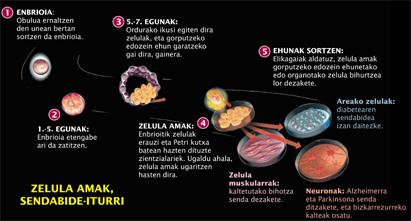
Buletina
Bidali zure helbide elektronikoa eta jaso asteroko buletina zure sarrera-ontzian








